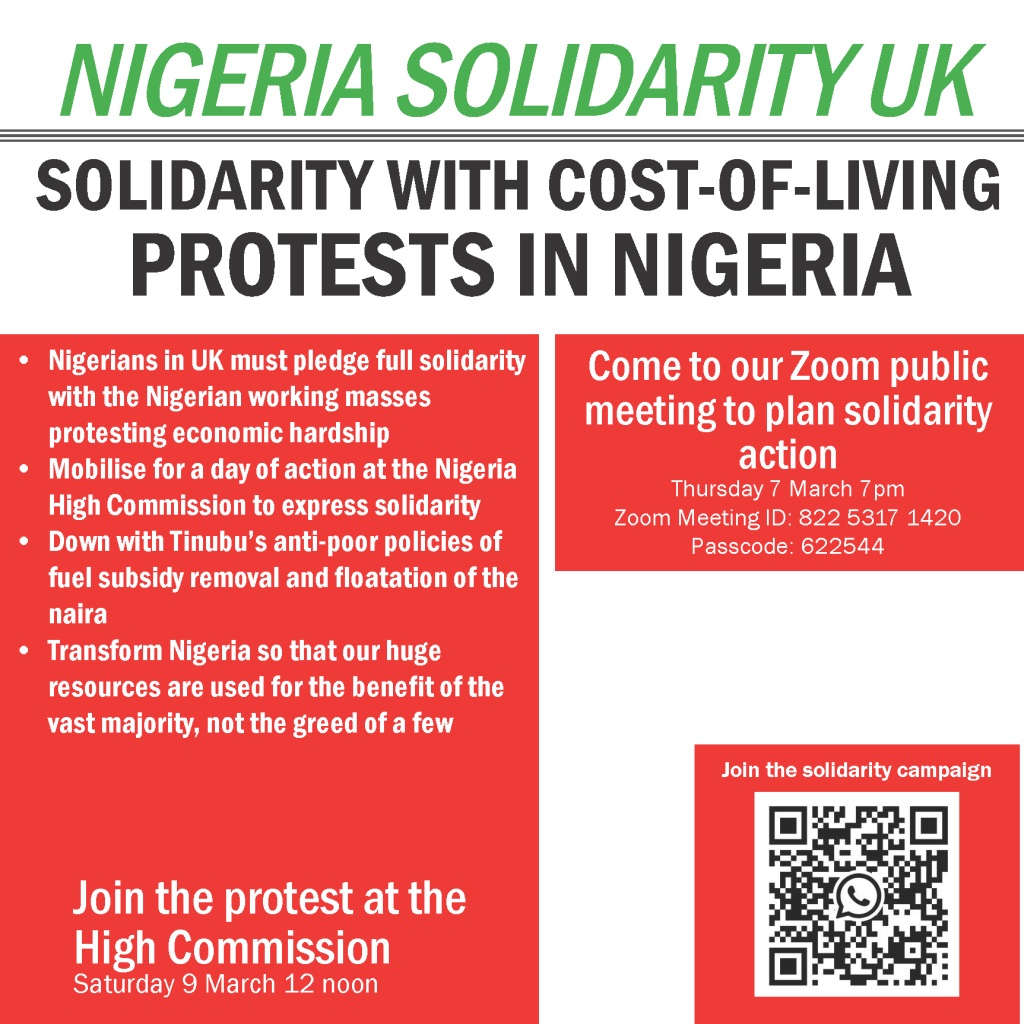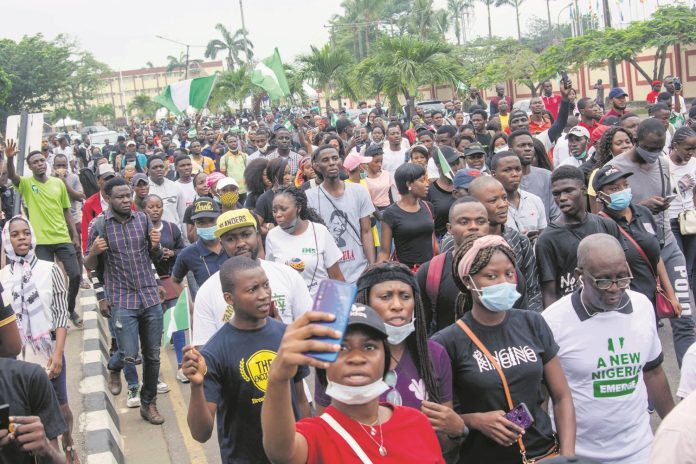Nigeria is in turmoil. A combination of economic crisis, a massive currency devaluation, insecurity, various insurgencies and most recently, neoliberal policies rushed though by the new president, have plunged the country into a grave social and economic crisis, which threatens to worsen. Living standards are rapidly falling, parts of the economy are coming to a halt and the International Monetary Fund is warning that inflation could rise to 44%. Street protests against rocketing food prices, beginning in northern Nigeria, are spreading.
An editorial in the Vanguard, a major Nigerian newspaper, wrote that “the federal and all state governments [have] to sit up and do something given the desperate situation Nigerians find themselves in, or the situation could get out of hand very quickly. Hunger and biting poverty have taken over the land. Even people who used to cater for the less-privileged are no longer able to foot their basic bills due to the harsh economic conditions. The protests in Niger, Kano and other places in the north are just warning shots.”
The two trade union federations, the NLC and TUC, issued on 8 February another ultimatum to the government, demanding action by 23 February, and the NLC have called two days of protest for 27-28 February. The NLC stated that if its demands are not met then it will issue “a seven-day notice that will expire on 2 March to the federal government, after which an indefinite nationwide strike will commence”.
The Democratic Socialist Movement (CWI Nigeria) issued the statement opposite on 19 February.
- More on the political crisis in Nigeria can be read at socialistworld.net: ‘Nigerian masses face extreme hardship due to President Bola Tinubu’s policies’
DSM welcomes NLC’s declaration of two-day nationwide protest over cost-of-living crisis
- Demands must include total reversal of the fuel price hike and deregulation, as well as immediate actions to halt the meteoric rise in food prices and other basic needs
- Knowing labour leaders’ penchant for last-minute suspension and compromise, we urge pro-labour civil society and activists to begin to mobilise independently for a national shutdown and mass protests
The Democratic Socialist Movement (DSM) welcomes the declaration by the leadership of trade union federation, the Nigeria Labour Congress (NLC), for a two-day nationwide protest on 27-28 February 2024 over the debilitating cost-of-living crisis. This declaration, coming on the heels of a 14-day notice for a general strike previously issued to the federal government on 8 February 2024, shows that the leadership of the trade union movement, which had initially and publicly scorned the idea of providing leadership for the mass anger of the Nigerian people, has found itself in a situation where it can no more ignore the rising tide of spontaneous mass protest breaking across the country over the past few weeks, in response to the deteriorating economic situation. Maintaining its previous stance and attitude could mean mass anger turning against it.
Over the past few weeks, spontaneous protests have broken out in Kano, Niger State, Osun State and more recently, Lagos, Sokoto and Ogun States. Even in places where protests are yet to break out, the livid rage of the working people and youth at the immeasurable suffering they have been plunged into is unmistakable, and it is only a matter of time before the dam breaks. No doubt representing a decisive change in the situation, these spontaneous protests are a signal that Nigerians are fed up with the devastating cost-of-living crisis that has led to increasing impoverishment for many, especially the working class, middle classes and the poor masses.
Clearly, the immediate responsibility for the astounding suffering lies at the feet of the Tinubu capitalist administration. Since 29 May 2023, when President Tinubu and the ruling All Progressive Congress (APC) were inaugurated, following an election which saw the slimmest margin of victory by any Nigerian president since 1979, he has made it clear that he is intent on unleashing a neoliberal capitalist economic agenda. This is in the form of fuel subsidy removal/price hike, devaluation of the naira alongside the intensification of policies of underfunding of public services like education and health, privatisation and deregulation. At the same time, it must not be forgotten that all the main parties’ presidential candidates advocated the removal of the so-called fuel subsidy.
By declaring a two-day nationwide mass action, the NLC can help to deploy the organisational and political might of the organised working class to strengthen and give concrete expression to this mass anger, thereby ensuring that it wins. But this can only happen if the NLC leadership is serious this time around and not simply repeating what it has always done in previous struggles, which is to declare actions only to suspend them at the last minute without any gains being secured, creating confusion and demoralisation in the movement. In fact, if the NLC had not suspended its planned general strike over subsidy removal on 6 June last year, there is a possibility that the Tinubu regime would not have had the confidence to carry through the subsequent neoliberal policies of currency devaluation, which have further worsened the situation for the mass of the people.
Therefore, should the NLC leadership repeat this tragic approach in the current circumstance, then they could invite unto themselves the justified anger of the angry masses and youth who already view the leadership of the trade union movement with suspicion. It should not be forgotten that the #EndSARS revolt broke out on 7 October 2020 following disappointment and anger over the last-minute suspension of a general strike by the Ayuba Wabba-led NLC on 28 September 2020. During the protest, many young people were hostile towards the idea of leadership and towards the labour movement in general, because of anger over the betrayals of the labour leadership during previous struggles.
To be forewarned, however, is to be forearmed. The DSM believes that workers and activists should not continue to tolerate, but instead organise to challenge, this penchant of the trade union leadership to act against the interests of the movement. Therefore, we propose that pro-labour groups like JAF, ASCAB, CORE, TIB, TPAPM, activists and socialists, in addition to the need for their own independent actions and initiatives for mass actions, should urgently begin to constitute democratic action committees at workplaces, campuses and the communities, to ensure the nationwide protest goes on regardless. Such a network of action committees set up across the country and acting on behalf of the Nigerian masses can quickly step in to declare for the planned action to go through. Through such action committees, further steps to take the struggle forward beyond 27-28 February can also be discussed and agreed.
At the time of writing, it seems only the NLC is behind the declared nationwide protest. The Trade Union Congress (TUC) which has often united with the NLC, is yet to issue any statement in this regard. For us in the DSM, we believe that the unity of the working class is crucial at this hour. To this extent, we call on the leadership of the TUC, as well as activists within the movement to argue for the need for the TUC to key into the date of 27-28 February.
We also urge the NLC and TUC not to limit the demands of the struggle to palliatives alone. We urge them to also demand the reversal of the fuel price hike and all neo-liberal policies which are the immediate causes of the present crisis.
However, while we embrace every concession, no matter how minor, that can be won for the working people, without the working class ending capitalism and taking over the running of society under a socialist programme, there is no way any concession, however won, can bring any lasting relief for the long-suffering working people and youth. By and large, we urge labour and working people to fight for the following set of demands:
- Reversal in the fuel price hike to pre-29 May 2023 levels
- Reversal of all neoliberal policies
- Reversal of recent hikes in school fees at tertiary institutions and for adequate funding and democratic management of public education at all levels
- Immediate fixing of public refineries, and their democratic ownership and management by the working people
- A price-cap on all petroleum products from the Dangote refinery in order to ensure affordability
- For trade union-led actions to ensure price control and prevent price gouging and hoarding of food and other essentials
- For an increase in the national minimum wage to meet the rate of inflation
- Immediate cut in the salaries and allowances of political office holders
- Public ownership of the banks, financial institutions, industries and oil refineries, under democratic workers’ control and management, in order to ensure Nigeria’s economy works for the needs of all and not the greed of a few
- For the building of a genuine mass workers’ party with a socialist programme









